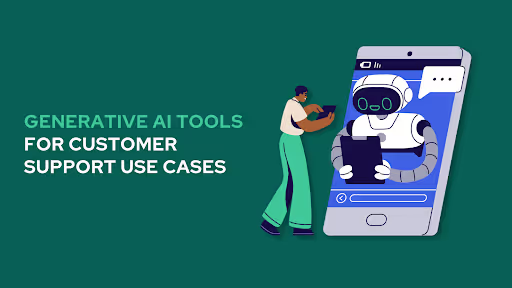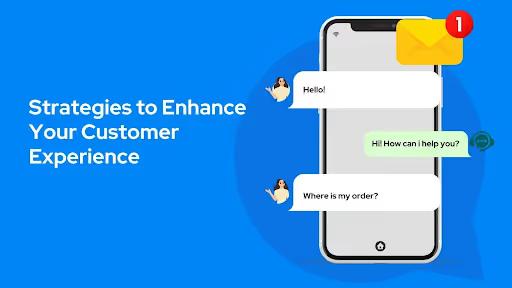The Evolution of Customer Support: How AI is Transforming the Industry

Introduction
Did you know that 82% of consumers expect an immediate response to their inquiries? As customer expectations evolve, businesses are turning to AI to meet the demands of the digital age, transforming customer support into a streamlined, personalized, and proactive experience. AI-powered customer service is no longer a futuristic vision—it’s happening right now, driving efficiency, personalization, and long-term loyalty. In this article, we’ll explore how AI is revolutionizing customer support, the challenges it solves, and the vast opportunities it opens up for businesses today.
The Traditional Model vs. AI-Driven Support
In the past, traditional customer support relied on human agents reacting to inquiries as they came in. While this worked for a time, it came with significant downsides—scalability issues, high operational costs, and a lack of personalization. Customers often found themselves waiting in long queues, only to repeat the same information to multiple agents, leading to frustration.
The Shift to AI has flipped this script. By automating routine tasks and delivering instant responses, AI has enabled a proactive model for customer support. AI-powered systems can handle an impressive volume of inquiries simultaneously, providing tailored solutions for individual needs. The result? Better customer satisfaction, reduced operational costs, and more efficient support teams.
How AI is Transforming Customer Support
The Power of Knowing Your Customers: Personalization at Scale
Personalization is no longer a luxury—72% of customers expect companies to understand their unique needs. AI enables businesses to provide this personalization at scale. By analyzing data like past interactions, purchase history, and behavioral patterns, AI offers tailored recommendations and solutions that make customers feel valued and understood. This type of personalization isn’t just nice to have—it’s crucial for building long-term loyalty.
More importantly, AI gets smarter over time. The more interactions it processes, the better it becomes at predicting customer needs. This learning loop ensures that AI-driven customer support stays relevant, adapting to changes in customer behavior seamlessly.
Staying Ahead: Predictive Analytics for Proactive Support
But personalization is only part of the story. To truly stay ahead, businesses must anticipate problems before they arise. AI excels at predictive analytics, identifying patterns in large datasets to foresee potential issues. For example, if a product generates repeated inquiries, AI can flag this and proactively offer solutions or guidance—sometimes before the customer even knows they have an issue.
This approach not only enhances the customer experience by reducing friction but also slashes operational costs. Businesses leveraging predictive support strategies have seen up to a 25% reduction in support costs, as fewer resources are needed to handle issues that never escalate.
Gauging Customer Emotions: Real-Time Sentiment Analysis
Understanding customer emotions is crucial for delivering empathetic support. AI-driven sentiment analysis allows businesses to assess customer emotions in real-time by analyzing the tone and content of their messages. If a customer is frustrated, AI can flag it immediately, prompting a human agent to step in or suggesting escalation before things get worse.
This level of emotional intelligence can be the difference between a customer leaving or staying, and it's particularly valuable in retaining customers by turning potentially negative experiences into positive ones.
Connecting Seamlessly: Enhanced Multichannel Support
Today’s consumers expect seamless support across multiple channels, be it social media, live chat, email, or phone. AI ensures consistent and connected experiences across all these channels. By centralizing customer data, AI enables support teams to view the entire customer journey, eliminating the need for customers to repeat themselves across different platforms.
For instance, imagine a customer starting a conversation on social media and then switching to live chat. With AI, the entire conversation history is preserved, allowing the support team to pick up right where the customer left off. This not only boosts efficiency but also enhances the customer experience.
Cost-Effective and Efficient: Operational Efficiency and Savings
Perhaps the most compelling reason for businesses to adopt AI is the dramatic cost savings it provides. AI can manage up to 80% of customer interactions, automating repetitive queries and reducing the need for large support teams. This allows businesses to allocate resources to more strategic tasks, improving overall productivity.
Furthermore, AI works 24/7, ensuring that customer inquiries are addressed promptly, even outside of regular working hours. For global businesses, this is a game-changer—offering support across multiple time zones without incurring extra labor costs.
The Gen Z Effect: Meeting Expectations in the Digital Age
Gen Z, the digital natives, expect instant, personalized responses. They are quick to switch brands if their expectations aren’t met. AI’s ability to provide fast, relevant support across digital channels like messaging apps and live chat is key to retaining this demographic.
With 60% of Gen Z consumers preferring digital communication, AI’s capability to integrate these channels ensures businesses stay connected with this tech-savvy generation, offering the immediacy they demand.
AI and Human Agents: A Synergistic Approach
While AI is transformative, it’s not here to replace human agents. Instead, it enhances human capabilities by taking care of routine inquiries, allowing agents to focus on more complex and emotionally nuanced issues. This hybrid model offers the best of both worlds—the speed and efficiency of AI, combined with the empathy of human interaction.
For example, AI can provide real-time insights to agents, suggesting the best course of action based on past interactions, helping them resolve issues faster while maintaining a personal touch.
Case Studies: Real-World Impact
Kapiva: Scaling Personalization with AI
Kapiva, a leading wellness brand, used LimeChat’s AI-driven e-commerce GPT bot to deliver personalized support on WhatsApp. By analyzing customer interactions, the bot provided tailored product recommendations and quick responses. The results were remarkable: customer satisfaction soared, and repeat purchases increased by 40%. This highlights how AI can effectively scale personalization, driving both customer satisfaction and revenue.
Man Matters: Automating 70% of Customer Queries
Man Matters, a health and wellness brand, implemented LimeChat’s AI solutions to automate 70% of their customer queries. With predictive analytics, the AI identified common issues before they arose, reducing response times by 50% and improving Customer Satisfaction (CSAT) scores by 20%. This case study illustrates how AI-driven predictive analytics can drastically improve support efficiency while enhancing the overall customer experience.
Frequently Asked Questions (FAQs)
- Is AI-powered customer service suitable for all businesses?Yes, AI can be customized to suit businesses across industries, enhancing efficiency and customer satisfaction.
- Will AI replace human customer support agents?No, AI works alongside human agents, handling routine tasks and providing insights to improve human interactions.
- How does AI enhance personalization in customer interactions?AI analyzes customer data to deliver tailored recommendations, creating more relevant and engaging experiences.
- What are practical steps to implement AI in customer service?Start with automating basic queries and gradually expand AI’s capabilities based on performance metrics and customer feedback.
- How can businesses measure the success of AI-powered customer service?Success can be measured by tracking response times, customer satisfaction scores, and issue resolution rates.
Conclusion
AI is not just a tool for efficiency; it’s reshaping the way businesses engage with their customers. By integrating AI into customer support strategies, companies can stay ahead of the curve in a rapidly evolving digital landscape. AI enables faster, smarter, and more personalized customer experiences, ultimately driving loyalty and business growth. At LimeChat, we’re at the forefront of this revolution, helping businesses harness AI to deliver exceptional customer support that delights and retains customers.
Transform your marketing and support today




.avif)


